(Or ‘The Jacob Marley of posts – by which I mean it’s heavy-laden with links’)
As noted in yesterday’s post, this is a predominantly indoorsy time, so I thought I’d share some stuff that might be of interest – I am, as I hope is clear, in no way saying “you must do this” about any of the following (especially the physical activities suggested), it’s really just a list of things that I’ve enjoyed, and you might too. So with that (hopefully kind of unnecessary) caveat out of the way, on to the list, with its arbitrary categories:
Physical activities
Being indoors all the time is hardly conducive to a lot of exercise – unless you’ve got loads of weights or one of those Peleton things – so it’s probably useful that in the UK one of the accepted reasons to go outside is once a day for exercise. But for people who can’t do that – no open spaces nearby, for example – a lot of folks in the health and fitness business have made their stuff accessible online; you’ve probably seen that Joe Wicks is doing daily workouts every morning, but I thought I’d share a few others. Key thing, I feel, is to find what works for you – they often say that mental and physical health are linked, so keeping the blood flowing is likely to help you stay chipper at this odd time.
I’ve embraced yoga in the last few years and found it’s very much for me, and luckily a couple of my teachers have gone online recently:
Meg of Real Life Yoga is one of the funniest teachers I’ve ever had, as you can probably tell by the video she’s posted of a yoga sequence to do if you’ve got a hangover; but she’s also posted some short, non-morning-after videos aimed at people who are working from home, which are worth a look.
Charlie is a very friendly and supportive teacher and I’ve attended his lessons several times, including a beautiful session in a candlelit church; he’s posted some instructional videos online especially for this time. They’re free to view, but if you can make a contribution that’d be lovely.
I’m currently six weeks into the at-home programme of Broga,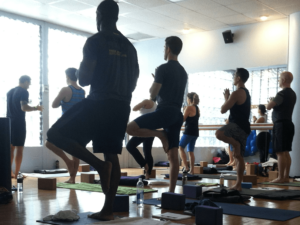 which is (as the name suggests) a version of yoga originally aimed at men (or at least, aimed at getting past male preconceptions about whether yoga is for them). It’s hard work, and more actively so than most yoga I’ve experienced, but it’s one of those workouts where you really feel the endorphins and the sense of achievement when you’re done. I’m using the DVD, but they’re very kindly hosting live classes online; as I understand it, you go to their Instagram page and press the Live button, and you should be good to go (I can’t be sure – I’m not on IG myself). Good news here is that not only are many of their instructors donating their fee to charity for doing these classes, but they’re also running additional classes, including ones for families, so definitely worth a look.
which is (as the name suggests) a version of yoga originally aimed at men (or at least, aimed at getting past male preconceptions about whether yoga is for them). It’s hard work, and more actively so than most yoga I’ve experienced, but it’s one of those workouts where you really feel the endorphins and the sense of achievement when you’re done. I’m using the DVD, but they’re very kindly hosting live classes online; as I understand it, you go to their Instagram page and press the Live button, and you should be good to go (I can’t be sure – I’m not on IG myself). Good news here is that not only are many of their instructors donating their fee to charity for doing these classes, but they’re also running additional classes, including ones for families, so definitely worth a look.
And in the world of yoga, one of the most well-known online instructors is, of course, Adriene – millions of subscribers and dozens of videos, suitable for beginners and expert alike, with a whole variety of durations; basically something for everyone, and a great place to start (the only reason I mention her further down the list here is because I wanted to start off with teachers and styles I have personal experience of).
Of course, yoga isn’t the only kind of exercise you can do indoors, and for many other ideas I heartily recommend Nerd Fitness – a site that doesn’t take itself seriously, but does take exercise seriously, and has a slew of great resources and exercise plans: for obvious geek reasons, I like their Batman Bodyweight Workout, but there are loads of other at-home workout routines. Definitely deserves a look, not least for the great Lego setups that illustrate so many of their articles.
Lastly on the physical exertion topic, I like to run – granted, it’s not for everyone (and not everyone is allowed out at the moment), but if you’re thinking this might be the time to try it out, then a lot of people I know (including m’colleague) have had a lot of success with Couch to 5K, often surprising themselves with just how much progress can be made in a pretty short period of time.
Meditation
Mens Sana in Corpore Sano, as the Romans had it (apologies for that Juvenal joke), and it’s probably fair to say that in the last few years topics of mental health and well-being have been much more openly discussed, with mindfulness and meditation being … well, I’d like to say ‘increasingly popular’, but I have no evidence of that to hand. But I’ve certainly seen a lot more articles on those topics in the papers and magazines, and they seem to get a lot of mentions in podcasts and the like, so I’ll assume this is in some way reflected in reality.
I’ve been a fan of meditation since my teens, and whilst I wish I could pretend that means I’m an expert at it, it still feels like something that I can still learn a lot about – that said, I’ve found it a great way of just getting centred and feeling a bit more in control of one’s thoughts and actions, particularly during turbulent times, so I’d recommend it – here are a couple of apps you can get for smartphones:
Insight Timer – my app of choice, it’s free and you can create your own sessions (selecting duration and background sounds), or listen to the guided meditations or talks by noted experts like Tara Brach.
Headspace – probably better known than Insight Timer, and a lot of people swear by it. It didn’t quite do it for me, but that’s probably just me trying to pretend I’m some kind of maverick, swimming against the tide and not liking the same stuff as everyone else. Yeah, lookit me, I’m a rebel. Ahem.
Calm – again, a very popular app, this one has a particularly elegant style (just click on Get Started and enjoy the interface), and even has bedtime stories read by people like Stephen Fry.
As ever, there are a wealth of resources online for this kind of thing, and since meditation essentially boils down to sitting comfortably, closing the eyes and focusing on the breath (as a starter; that’s not the entirety of it, obviously), you should be able to get started for pretty much the sum of zero pence. The best things in life can, after all, be free.
Right, so that’s enough of you looking after yourself, let’s move on to entertainment…
Streaming TV and Films and stuff
I’m not even going to try to list everything that’s available (I know that, for example, the BBC have put loads of box sets of TV series onto iPlayer, and I’m sure you know what kind of thing you’re into), but here are a couple of things I have found and enjoyed…
Netflix – As well as six seasons of Brooklyn Nine-Nine, a delightfully warm-hearted and upbeat comedy, I recently found and thoroughly enjoyed the film Extra Ordinary; 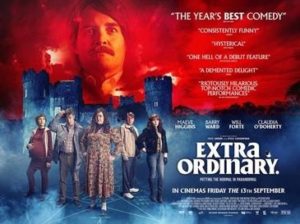 put me in mind of a cross between Derry Girls and Ghostbusters, and is a lot of fun. I wasn’t familiar with the cast or creatives involved (apart from Will Forte, who seems to be having a lot of fun), but they’ve all done a terrific job. Really worth your time.
put me in mind of a cross between Derry Girls and Ghostbusters, and is a lot of fun. I wasn’t familiar with the cast or creatives involved (apart from Will Forte, who seems to be having a lot of fun), but they’ve all done a terrific job. Really worth your time.
iPlayer – As mentioned above, they’ve put a whole load of shows up to help the nation stay entertained while we’re all indoors, and whilst the list could go on for ages, I’d particularly highlight the fact that every episode of Inside No.9 is there to be watched; they’ve just finished their fifth series, and it’s maintained a consistently high standard, to the extent that I wonder if I, as a viewer might be in danger of taking for granted just how ruddy good it is. If you’ve not seen it yet, this is a great chance to catch up.
And possibly hidden in the films section on iPlayer is the frankly bonkers film Mindhorn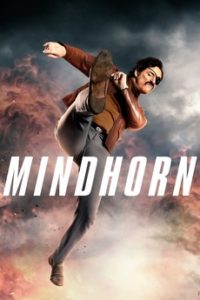 , which is funny, clever, and only about 85 mins, so it doesn’t have time to drag. That’s how to do it.
, which is funny, clever, and only about 85 mins, so it doesn’t have time to drag. That’s how to do it.
All4 – I mentioned above that some programmes are so good that it’s easy to almost overlook that consistent quality – and Friday Night Dinner is one of them. The sixth season is currently showing on Channel 4, and there’s no drop in story quality whatsoever, and the performances are just as solid… by which I mean solidly ridiculous, most of the time. All the episodes are currently available to view on All4.
Oh, and I mentioned Derry Girls earlier, which is also on the All4 site, and which is terrific.
Aside from the above (and other streaming services which I don’t have and so haven’t mentioned), there are some interesting cultural whatnots worth checking out:
National Theatre Live – in the last couple of years, the National Theatre have taken to screening filmed versions of some of their plays (and transmitting them to cinemas around the country, which strikes me as a clever way of getting stuff seen by people who (a) don’t live nearby or (b) don’t know if they want to spend forty quid or more on a production they may not like that much).
As theatres are closed right now, the NT has started screening a play every Thursday on their YouTube channel, and it remains there for a week, so don’t feel you have to watch it in real time. As I type this, Jane Eyre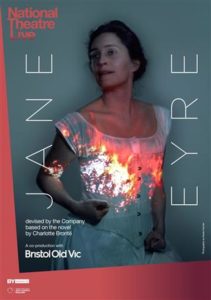 is the current play, and I believe that one of the future presentations will be the production of Twelfth Night from a couple of years ago, starring Tamsin Greig, which I thought looked interesting, but never got to see, so I’ll be looking out for that.
is the current play, and I believe that one of the future presentations will be the production of Twelfth Night from a couple of years ago, starring Tamsin Greig, which I thought looked interesting, but never got to see, so I’ll be looking out for that.
Royal Opera House – In a similar vein, the ROH are screening a selection of performances of opera and ballet on their YouTube channel. I’ll cheerfully admit that whilst I like me a bit of opera, ballet’s a bit of a blind spot to me, but maybe this is the perfect time for me to try some, with time and money less at risk if I do so? Worth a look.
Podcasts – are like the radio shows you can pause and rewind, and so are a great way to hear other people’s voices, and opinions, and learn stuff and laugh (or all of those things). Plus you can get on with stuff like washing and tidying while they keep you company. I’m sure you can find a ‘cast (that’s what the cool kids call them, don’t let anyone tell you otherwise) on a subject of interest to you, but the following are ones which I always enjoy:
How to Fail – Elizabeth Day talks to successful people, about how they’ve been shaped by their failures… that’s a really dry summary of a really interesting show.
Scriptnotes – John August and Craig Mazin’s long-running ‘cast about writing. Mainly for the screen, but loads of lessons about creativity and the like anyway (this week’s episode has Ryan Reynolds and Phoebe Waller-Bridge as guests! How cool is that? Well, actually I don’t know how cool, as I haven’t listened to it yet. But I’ve listened to the previous 444 episodes, and they’ve all been good, so the pedigree of the show and the guests alike suggests it won’t be rubbish).
The One You Feed – host Eric Zimmer talks to people in the fields of religion, psychology, philosophy and … er, let’s say spirituality, about the quest to live a better life. That makes it sound a bit woo-woo, but it’s usually pretty practical, and I’ve learned a lot from it. Your mileage, as they say, may vary, probably dependent on who the guest is in any given episode, but definitely worth a go.
… and of course, a whole host of other podcasts are available, from a whole host of sources; BBC Sounds, iTunes, whatever. It’s kind of like the way you figure out what music you like, I guess – have a look in a chosen area, give something a go, see what happens or what it might lead to. Actually, that sounds more like a general approach to life, I guess? Yeah, why not.
I haven’t mentioned books or magazines here – again, there are so many of them around, and most people I know already have enough stuff in their ‘to read’ pile. But this might be a good time to read that book you’ve been ‘planning to get round to’? For my part, I’m thinking of reading some Jane Austen for the first time since secondary school (any suggestions as to whether I should go for P&P or S&S gratefully received. Whaddayamean, that’s not what the literary establishment call the books? Hmph).
Food and Drink
This is, of course, a great time to eat and drink the whole day long, but that may not be the best idea, and I can already imagine the marketing departments of various weight-loss firms are planning their post-lockdown advertising campaigns and rubbing their hands together with excitement. As with so many things a healthy balance is probably the way to go. As I always say, moderation is the only thing one should do to excess.
Drink-wise, do get lots of water, it’s cheap and hydration’s never a bad thing; I’d recommend loads of tea as well, but it’s up to you.
Same goes for food, of course – it’s tricky enough getting hold of some staple food items that you’ll probably want to focus on hitting the usual food groups, though could be a fun time to learn some new recipes – I’ve recently tried out a three-ingredient recipe for peanut butter cookies, which came out pretty well, and was hassle-free. There are loads of recipe sites online, so if you have some stray things in the fridge or cupboard, might be worth a quick online search to see what culinary magic you might be able to perform.
And I think that’s enough to be going on with, don’t you? I hope that there’s at least something – if not several somethings – in the above that might be of interest to you. But even if not, I hope you’re doing okay, and staying safe.

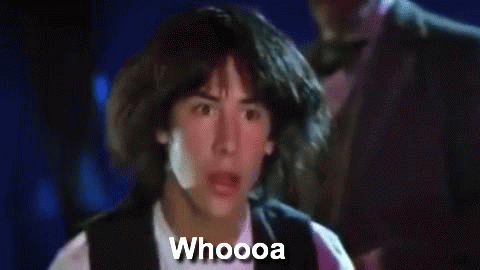








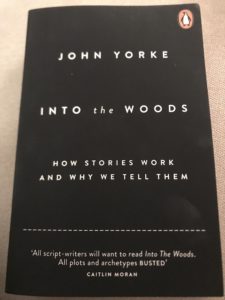 I’m currently reading Into The Woods by John Yorke, which (as you may know) is about stories and storytelling. Unsurprisingly, it features quite a bit of discussion of structure, which is a subject I’ve been thinking about quite a lot recently, and in the spirit of self-indulgent sharing, it’s the springboard for this blogpost.
I’m currently reading Into The Woods by John Yorke, which (as you may know) is about stories and storytelling. Unsurprisingly, it features quite a bit of discussion of structure, which is a subject I’ve been thinking about quite a lot recently, and in the spirit of self-indulgent sharing, it’s the springboard for this blogpost.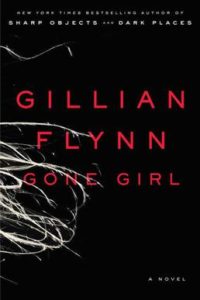 Maybe I’m being optimistic, but I think there’s been a bit of a rise of narratives with unusual structure over the past few years – to give a couple of examples,the success of Gone Girl in both written and filmed form was testimony to audiences’ willingness to watch events play out of sequence, and complex structure was a key aspect of Steven Moffatt’s work on Doctor Who (though he doesn’t need time travel as a plot device to enable this kind of thing, as fans of his earlier work Coupling [and I am one of those fans] will be aware). There are often suggestions that audiences are becoming increasingly sophisticated and aware of how narrative works, and I guess that willingness to accept breaking and bending of the A to B shape of a tale may well be a part of that.
Maybe I’m being optimistic, but I think there’s been a bit of a rise of narratives with unusual structure over the past few years – to give a couple of examples,the success of Gone Girl in both written and filmed form was testimony to audiences’ willingness to watch events play out of sequence, and complex structure was a key aspect of Steven Moffatt’s work on Doctor Who (though he doesn’t need time travel as a plot device to enable this kind of thing, as fans of his earlier work Coupling [and I am one of those fans] will be aware). There are often suggestions that audiences are becoming increasingly sophisticated and aware of how narrative works, and I guess that willingness to accept breaking and bending of the A to B shape of a tale may well be a part of that.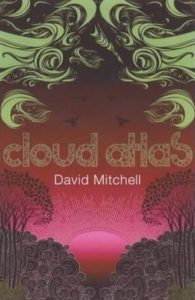 But whether it’s part of a wider phenomenon or not, I’ve long been a fan of structure; as a reader, once I recognise it, I find it reassuring (and in the case of Cloud Atlas, it took me until the midpoint of the book to realise what the author was doing, but when the penny dropped, it did so in a very satisfying way), and as a writer – you knew I’d get to this eventually – I find it very useful.
But whether it’s part of a wider phenomenon or not, I’ve long been a fan of structure; as a reader, once I recognise it, I find it reassuring (and in the case of Cloud Atlas, it took me until the midpoint of the book to realise what the author was doing, but when the penny dropped, it did so in a very satisfying way), and as a writer – you knew I’d get to this eventually – I find it very useful. And from a writing standpoint – and especially working, as I do, in the crime/thriller genre where plot is key – there’s something very useful about having a structure to work to; that might be a simple three or even five act structure, it might simply mean having the story starting and ending at the same place or in a similar way to hint at some idea of symmetry, or whatever, but if you have a structure sorted out ahead of time that lets you know what you should be writing about next, then that’s very useful indeed.
And from a writing standpoint – and especially working, as I do, in the crime/thriller genre where plot is key – there’s something very useful about having a structure to work to; that might be a simple three or even five act structure, it might simply mean having the story starting and ending at the same place or in a similar way to hint at some idea of symmetry, or whatever, but if you have a structure sorted out ahead of time that lets you know what you should be writing about next, then that’s very useful indeed.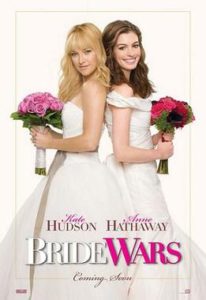 However, given that the story is in itself a ‘ticking clock’ tale with a set ending looming on the horizon and moving closer in stages (akin to most films featuring weddings, for example: the wedding is a fixed point in time and everything we see is drawing us closer to that), it did occur to me that having a race against time which is also viewed through the fragmented narrative of rotating POVs would perhaps be too much to put on top – and given that (again, non-spoiler, given the genre expectations) the paths of the Detective and the Kidnappers will inevitably cross, whose narrative section should I include that in? The Detective closing in, or the Villains realising that things aren’t panning out as planned? I wasn’t sure.
However, given that the story is in itself a ‘ticking clock’ tale with a set ending looming on the horizon and moving closer in stages (akin to most films featuring weddings, for example: the wedding is a fixed point in time and everything we see is drawing us closer to that), it did occur to me that having a race against time which is also viewed through the fragmented narrative of rotating POVs would perhaps be too much to put on top – and given that (again, non-spoiler, given the genre expectations) the paths of the Detective and the Kidnappers will inevitably cross, whose narrative section should I include that in? The Detective closing in, or the Villains realising that things aren’t panning out as planned? I wasn’t sure.


